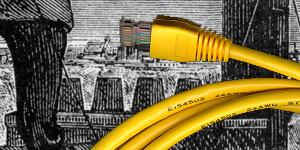


The Politics of Power
In 1989, a fifty-year-old empire began to fall apart. Two years later it was dead. A wave of change crashed over Eastern Europe, crumbling old power structures, cracking the Berlin Wall, and leaving power vacuums swirling in its wake. Poland, Hungary, Czechoslovakia, and East Germany changed their governments in weeks. Even the brutal autocracies in Romania and Bulgaria collapsed almost overnight. The Soviet Union was brought to its knees in part because its command economy couldn't keep up with the enormous cost of modern war machines. But new communication technology played a part as well.Governments know that arming their populations is only wise if they won't turn their guns on you. For example, in the old Soviet Union it was a crime for an individual to own a copy machine---because it could be used to incite a revolt. Today fast, cheap, reliable communication technology is beginning to erase ancient political boundaries in a way that the gun and the tank never could.
What was true for copiers was also true for personal computers, printers, video cameras, videocassette recorders, home satellite dishes, fax machines, cellular telephones, and all the other techno-paraphernalia of computation and communication today. All were made possible by computer technology, and all were severely restricted in eastern Europe. Restricting such devices, however, created profound disadvantages. Those economies then lagged even further behind those of more open societies, until one day there was simply not enough of everything to go around and the people revolted.
Of course, that's an oversimplification of a complex process. Democratic countries probably won the Cold War because their economies were robust enough to win the last ruinous arms race. Nonetheless, it's no coincidence that personal computers and other choice-enhancing, information-distributing devices were becoming widespread in advanced countries by 1981 and that ten years later European communism was essentially dead.
Computers are not just toys. People who learn to use them (or at least, not to fear them) can turn their knowledge to productive use. This ability is useful on the factory floor, where robotics, more-efficient planning, greater flexibility, and enhanced predictability soon become the norms. The Soviet Union, by keeping such technology from its population, was trying to run a race by first breaking its legs.
Computers don't just benefit industrial production; they also make possible unprecedented improvements in communications. And that always has political consequences. During the 1991 attempted coup in Russia, for example, programmers used their computers to keep in touch with the rest of the world, even though the insurgents controlled the centralized radio, television, and newspaper facilities. Messages traveled from Moscow to Vladivostok, to Berkeley, to London, and back, while the technologically illiterate old-timers were powerless to stop them. In the old days, it was easy for Moscow to prescribe what the entire country thought simply by controlling the central broadcasting stations. Not anymore. This time, millions watched the coup unfold, and the glare of publicity proved too bright.
The wave of change that began in 1989 was also encouraged by the inexorable creep of these same technologies into inflexible regimes, despite governmental discouragement. Through gifts and smuggling, eastern Europeans with satellite dishes could finally see and hear for themselves what goods were freely available in the West. And they wanted them too. The Berlin Wall could keep the people in, but it couldn't keep the satellite broadcasts out. After living in what was essentially a wartime economy for fifty years, and finally seeing Western television, eastern Europeans decided that they wanted Coca-Cola, and they wanted blue jeans, and they wanted freedom. So perhaps the end was in sight for the Soviet Union as soon as the first cheap videocassette recorder rolled off the assembly line in Japan.
These same technologies also have consequences for the West. Our current structure of government, for example, is a holdover from the days when it was a day's or a month's journey to the nation's capital and most people couldn't leave the farm to vote. We therefore chose representatives to serve as our voices on the national scene. These representatives then chose someone to represent the overall body, and so on up the chain of command.
That hierarchy is no longer essential. Geography is irrelevant in the computer age. It might be possible, for example, to have all major decisions voted on by nationwide referenda rather than electing representatives and having them vote. Such a system sounds more democratic. But what would it do to politics?
Well, for one thing, power brokers would be very annoyed. Instead of influencing a few people they would have to influence millions. Of course, the politically cynical among us will conclude that power brokers will simply spend more time and money influencing the vote through the mass media. Besides, once a vote is taken, it will still have to be implemented, and we can't be involved every step of the way---we bore too easily. Politicians, it seems, will have an interesting life for decades to come.
Even now, politicians around the world know they usually don't have to appeal directly to the voters; they only have to appeal to the business and professional elites who really run the country. The more money you have behind you, it appears, the higher are your chances of winning. So it may no longer be one person one vote, but one dollar one vote. Perhaps we no longer hold elections---we hold auctions.